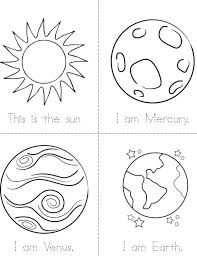Exploring My Solar System
Our solar system is a vast and wondrous place, filled with celestial bodies that have captured the imagination of humanity for centuries. As we look up at the night sky, we see not just stars but a whole system of planets, moons, asteroids, and comets that orbit our Sun.
The Sun: Our Guiding Star
At the center of it all is the Sun, a massive ball of hot plasma that provides light and warmth to all the planets in our solar system. It is the largest object in our system and holds everything else in its gravitational embrace.
The Inner Planets
Mercury, Venus, Earth, and Mars make up the inner planets of our solar system. Earth, our home planet, is unique in its ability to support life due to its perfect distance from the Sun and its protective atmosphere.
The Gas Giants
Beyond Mars lie the gas giants: Jupiter, Saturn, Uranus, and Neptune. These massive planets are primarily composed of hydrogen and helium and have fascinating features such as rings (like Saturn) and powerful storms (like Jupiter’s Great Red Spot).
The Dwarf Planets
In addition to the eight recognized planets in our solar system, there are also dwarf planets like Pluto and Eris that orbit the Sun. While smaller in size compared to traditional planets, these objects still play a significant role in understanding the dynamics of our cosmic neighborhood.
Moons, Asteroids, and Comets
Our solar system is also home to numerous moons orbiting around planets like Jupiter (with over 80 moons) and Saturn (with its famous moon Titan). Additionally, asteroids and comets roam through space, occasionally crossing paths with Earth.
Exploring Beyond
As technology advances, humans are setting their sights on exploring beyond our own solar system. Missions like Voyager 1 and Voyager 2 have already ventured into interstellar space while ongoing efforts continue to search for exoplanets orbiting distant stars.
In conclusion, my solar system is a marvel of cosmic engineering that continues to inspire awe and wonder in all who gaze upon it. From the fiery depths of the Sun to the icy plains of Pluto, each celestial body has a story to tell about our place in the universe.
5 Essential Tips for Optimizing Your Solar System’s Efficiency
- Regularly clean the solar panels to ensure maximum sunlight absorption.
- Monitor the performance of your solar system to detect any issues early on.
- Trim any nearby trees or bushes that may cast shadows on the solar panels.
- Consider investing in a battery storage system for excess energy produced during sunny days.
- Schedule annual maintenance checks with a professional to keep your solar system running efficiently.
Regularly clean the solar panels to ensure maximum sunlight absorption.
Regularly cleaning the solar panels is crucial to ensure maximum sunlight absorption efficiency in your solar system. Dust, dirt, and debris can accumulate on the panels over time, hindering their ability to capture sunlight and convert it into energy. By maintaining clean solar panels, you can optimize the performance of your system and enhance its overall energy production. Regular cleaning not only helps to increase the efficiency of your solar setup but also prolongs the lifespan of your panels, ensuring they continue to generate clean and sustainable energy for years to come.
Monitor the performance of your solar system to detect any issues early on.
Monitoring the performance of your solar system is crucial to ensuring its efficiency and longevity. By keeping a close eye on its operation, you can detect any potential issues early on and address them promptly. Regular monitoring allows you to optimize energy production, identify any malfunctions or inefficiencies, and ultimately maximize the benefits of your solar investment. Stay proactive in monitoring your system to enjoy continued savings and sustainable energy usage for years to come.
Trim any nearby trees or bushes that may cast shadows on the solar panels.
To optimize the efficiency of your solar panels, it’s essential to trim any nearby trees or bushes that may cast shadows on them. Shadows can significantly reduce the amount of sunlight reaching your panels, thereby decreasing their energy production. By keeping the area around your solar panels clear of obstructions, you can ensure that they receive maximum sunlight exposure throughout the day, allowing them to generate more clean and sustainable energy for your home.
Consider investing in a battery storage system for excess energy produced during sunny days.
Consider investing in a battery storage system for excess energy produced during sunny days. By harnessing the power of the sun through solar panels, you can store any surplus energy generated for later use, ensuring a more sustainable and efficient energy solution for your home or business. A battery storage system not only allows you to reduce your reliance on traditional grid power but also provides a reliable backup during times of low sunlight or power outages. This forward-thinking approach not only benefits the environment but also offers long-term cost savings and energy independence.
Schedule annual maintenance checks with a professional to keep your solar system running efficiently.
To ensure optimal performance and longevity of your solar system, it is advisable to schedule annual maintenance checks with a professional. By having a qualified technician inspect your system regularly, you can identify and address any issues promptly, ensuring that your solar system continues to operate efficiently. Regular maintenance can help prevent potential problems, maximize energy production, and ultimately extend the lifespan of your solar setup. Investing in annual maintenance checks is a proactive way to protect your investment and reap the full benefits of clean, sustainable energy from your solar system.

